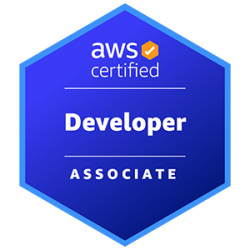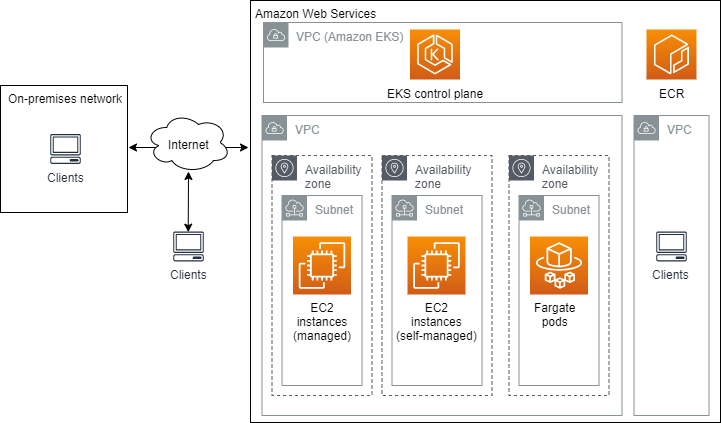Running Containers on Amazon Elastic Kubernetes Service (Amazon EKS)

The Running Containers on Amazon Elastic Kubernetes Service (Amazon EKS) (COREKS) course is designed for participants who want to learn the skills needed to run and manage containers on Amazon Elastic Kubernetes Service (Amazon EKS). During the course, participants will learn how to create, manage, and scale Kubernetes clusters on AWS using Amazon EKS. In addition, the course covers basic container and Kubernetes concepts, as well as best practices for managing and securing containers on Amazon EKS. Participants will also gain practical skills through hands-on labs that include creating and managing Kubernetes clusters, using AWS services such as Amazon RDS and Amazon EFS with containers, and more. The course contributes to the AWS Certified DevOps Engineer – Professional certification and the AWS Certified Developer – Associate certification .
Course Objectives
The following is a summary of the main objectives of the Running Containers on Amazon Elastic Kubernetes Service (Amazon EKS) (COREKS) course :
- Creating and Managing Kubernetes Clusters: Learn how to create, manage, and scale Kubernetes clusters on AWS using Amazon EKS.
- Understanding Containers and Kubernetes: Cover basic container and Kubernetes concepts essential to managing containers on Amazon EKS.
- Container Management and Security Best Practices: Learn best practices for managing and securing containers on Amazon EKS.
- Using AWS Services with Containers: Gain hands-on skills in using AWS services, such as Amazon RDS and Amazon EFS, in combination with containers.
- Hands-On Labs: Develop hands-on skills through labs that include creating and managing Kubernetes clusters and using AWS services with contain
- Configuring networking and storage solutions for Kubernetes applications on Amazon EKS.
- Implementing monitoring and logging solutions to track container performance and health.
- Troubleshooting and resolving common issues related to Kubernetes clusters and containerized applications.
Course Certification
This course helps you prepare to take the:
AWS Certified Developer – Associate Exam ;
Course Outline
Module 1: Kubernetes Fundamentals
- Container orchestration
- Kubernetes objects
- Kubernetes internals
Module 2: Amazon EKS Fundamentals
- Introduction to Amazon EKS
- Amazon EKS control plane
- Amazon EKS data plan
- Fundamentals of Amazon EKS security
- Amazon EKS API
Module 3: Building an Amazon EKS Cluster
- Configuring your environment
- Creating an Amazon EKS cluster
- Demo: Deploying a cluster
- Deploying worker nodes
- Demo: Completing a cluster configuration
- Preparing for Lab 1: Building an Amazon EKS Cluster
Module 4: Deploying Applications to Your Amazon EKS Cluster
- Configuring Amazon Elastic Container Registry (Amazon ECR)
- Demo: Configuring Amazon ECR
- Deploying applications with Helm
- Demo: Deploying applications with Helm
- Continuous deployment in Amazon EKS
- GitOps and Amazon EKS
- Preparing for Lab 2: Deploying Applications
Module 5: Configuring Observability in Amazon EKS
- Configuring observability in an Amazon EKS cluster
- Collecting metrics
- Using metrics for automatic scaling
- Managing logs
- Application tracing in Amazon EKS
- Gaining and applying insight from observability
- Preparing for Lab 3: Monitoring Amazon EKS
Module 6: Balancing Efficiency, Resilience, and Cost Optimization in Amazon EKS
- The high level overview
- Designing for resilience
- Designing for cost optimization
- Designing for efficiency
Module 7: Managing Networking in Amazon EKS
- Review: Networking in AWS
- Communicating in Amazon EKS
- Managing your IP space
- Deploying a service mesh
- Preparing for Lab 4: Exploring Amazon EKS Communication
Module 8: Managing Authentication and Authorization in Amazon EKS
- Understanding the AWS shared responsibility model
- Authentication and authorization
- Managing IAM and RBAC
- Demo: Customizing RBAC roles
- Managing pod permissions using RBAC service accounts
Module 9: Implementing Secure Workflows
- Securing cluster endpoint access
- Improving the security of your workflows
- Improving host and network security
- Managing secrets
- Preparing for Lab 5: Securing Amazon EKS
Module 10: Managing Upgrades in Amazon EKS
- Planning for an upgrade
- Upgrading your Kubernetes version
- Amazon EKS platform versions
Course Mode
Instructor-Led Remote Live Classroom Training;
Trainers
Trainers are Amazon AWS accredited instructors and certified in other IT technologies, with years of practical experience in the sector and in training.
Lab Topology
For all types of delivery, the participant can access the equipment and actual systems in our laboratories or directly in international data centers remotely, 24/7. Each participant has access to implement various configurations, Thus immediately applying the theory learned. Below are some scenarios drawn from laboratory activities.

Course Details
Course Prerequisites
Attendance at the AWS Cloud Practitioner Essentials Course , and the AWS Technical Essentials Course , is recommended . Requires basic networking and Linux knowledge .
Course Duration
Intensive duration 3 days;
Course Frequency
Course Duration: 3 days (9.00 to 17.00) - Ask for other types of attendance.
Course Date
- Running Containers on Amazon Elastic Kubernetes Service (Formula Intensiva) – On Request – 9:00 – 17:00
Steps to Enroll
Registration takes place by asking to be contacted from the following link, or by contacting the office at the international number +355 45 301 313 or by sending a request to the email info@hadartraining.com

